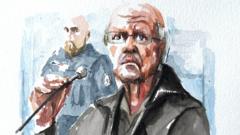Joel Le Scouarnec, a 74-year-old former surgeon, has received a 20-year prison sentence for the sexual abuse of hundreds of patients, predominantly children, between 1989 and 2014. The sentencing, delivered by Judge Aude Burési, came after Le Scouarnec's admission of guilt regarding the sexual assaults of 299 victims, showcasing a long history of exploitation targeting vulnerable patients, often while they were under anaesthesia.
During the court proceedings, Le Scouarnec, appearing emotionless in black attire, heard the court's rationale for the sentence, which highlighted the particular vulnerability of his victims. With a mandatory minimum term of two-thirds and considering he has already served seven years for a previous conviction, he could potentially be released on parole by 2030.
Victims expressed outrage at the perceived leniency of the sentence. Amélie Lévêque, one of those affected, voiced her distress at the prospect of Le Scouarnec being free to live a normal life while they struggle with the trauma of their experiences. Francesca Satta, an attorney representing some victims, echoed this sentiment, stating that the punishment felt inadequate compared to the number of victims involved in the trial.
Le Scouarnec, already serving a 15-year sentence for unrelated sexual offenses committed against children, has been a subject of scrutiny since evidence emerged regarding his journal entries detailing the assaults, which often took place during medical procedures. His heinous acts have been linked to further tragedies, including the deaths by suicide of two of his victims, a fact he acknowledged during the trial.
The case has opened further dialogues about systemic failures in the medical community, with critics calling for improved accountability and legal reform to ensure more stringent consequences for similar cases in the future. The National Order of Doctors in France expressed regret for not preventing him from practicing, highlighting a lack of effective communication within medical oversight bodies.
As the victims rallied outside the courthouse, they lamented the broader social indifference to their suffering, with many calling for a recognition of the systemic issues that allowed such abuse to persist unchecked for years. The emotional toll on victims emphasizes the need for protective measures in healthcare and justice systems to avoid repeating such tragedies.



















